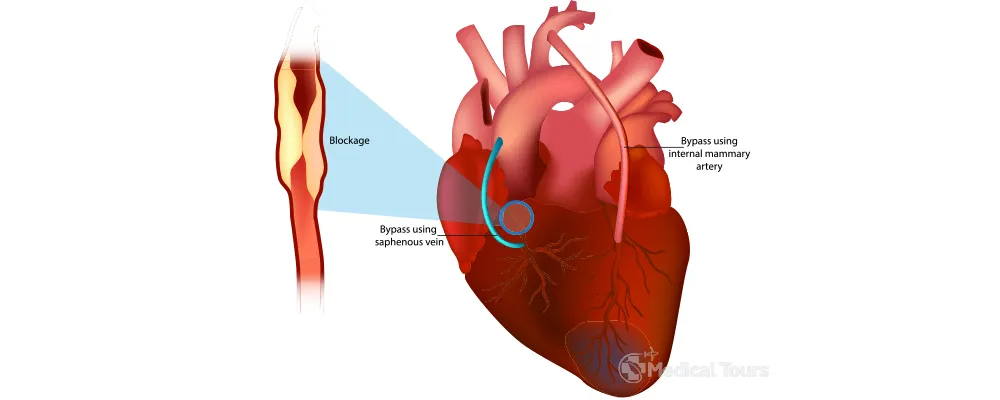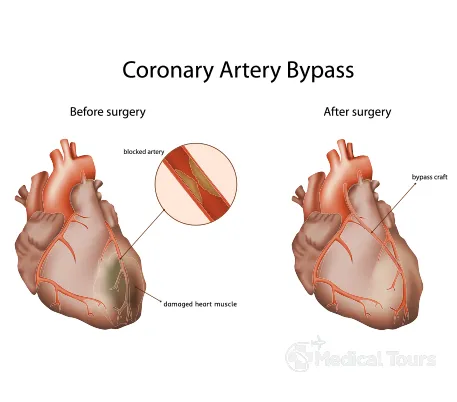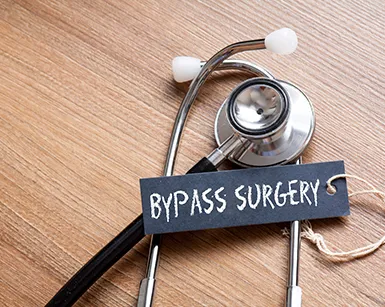India, the world's most popular medical destination, is known for offering a wide range of treatment alternatives at very reasonable prices. Your medical journey will be hassle-free and seamless thanks to immediate treatment, world-renowned experts, technologically equipped hospitals, and a high success rate.In India, the cost of heart bypass surgery ranges from about (USD 2,700 to 7,000) (INR 2,00,000 to 5,18,000).
For several blockages, heart bypass surgery is the most reliable method and, in some circumstances, the only option. The cost of surgery varies depending on the facility you choose, the surgeon's experience, and the type of operation you choose.
In India, several factors influence the cost of heart bypass surgery. Here, the cost of CABG varies from one facility to the next. There are a few elements that influence the final cost that patients may face if they choose to get treated in Indian hospitals.
The following are some of the elements that influence the cost of CABG in India:
| Country | Cost in USD | Cost in INR |
|---|---|---|
| USA | $1,23,000 | ₹97,54,453 |
| Singapore | $17,000 | ₹13,48,176 |
| Thailand | $15,000 | ₹11,89,567 |
| Turkey | $13,900 | ₹11,02,332 |
| Malaysia | $12,100 | ₹9,59,584 |
| India | $7,000 | ₹5,55,131 |
As you can see, the cost of heart bypass surgery in India is very low, and the medical infrastructure is comparable to that of other countries. As a result, many international patients prefer to have their heart bypass surgery performed at an Indian hospital.
Coronary Artery Bypass Grafting or CABG is a surgical treatment used to enhance blood flow to the heart. There are a lot of best hospitals in India for CABG surgery, with experts doing the procedure with the best cardiac bypass surgeons everywhere.It is also called heart bypass surgery.
Patients with arteriosclerotic disease, often known as coronary artery disease or CAD, may benefit from this operation, which is highly recommended by cardiologists. The coronary artery narrows as fatty substances get deposited on the walls of the arteries. This causes the heart's blood flow to be disrupted. As a result, the heart's blood supply gets inadequate, reducing its efficiency.
So, the surgeon performs heart bypass surgery (CABG) to improve blood flow to the heart. Coronary artery bypass surgery is extremely popular in India. A surgeon grafts blood vessels from other parts of the body into the heart to bypass clogged or damaged arteries. After a blockage obstructs the route, the goal is to get more blood and oxygen to the heart. Heart bypass surgery works in the same way that traffic or signal controllers do when they clear a clogged route.
Angina is a type of chest pain caused by coronary artery disease (CAD). The most common cause of heart attacks, according to cardiologists, is CAD.
Also, although the operation does not treat the heart disease at its source, it does alleviate the symptoms, and in certain cases, it can improve heart health and reduce the chance of death from heart failure. You may be asked to rest and follow a healthy regimen after surgery to help you feel better. Many people can live a long and healthy life.
Coronary artery disease also known as CAD is one of the most common heart problems in the world. It occurs when plaque builds up inside your coronary arteries and narrows them. This decreases blood flow to your heart which increases your risk of having a heart attack or stroke. A person with coronary artery disease will have one or more of the following symptoms:
Other nonspecific symptoms include bodily discomfort, weariness, and weakness, as well as vomiting and nausea. Angina is a chest condition characterized by heaviness, discomfort, or tightness. It could also be an indication that your arteries are obstructed or damaged.
Your cardiologist (heart doctor) will first ask you about your symptoms, take your medical history, go through your risk factors, and perform a physical exam, unless your condition is an emergency (you're experiencing a heart attack or stroke).
Some diagnostic exams include:
CABG is one of the most common types of heart surgery. It is also known as coronary artery bypass grafting. The procedure involves removing a blockage in the coronary arteries, which supply blood to the heart muscle, and then connecting healthy blood vessels from other parts of the body to those locations.
The three types of (CABG) Heart Bypass Surgery are:
Heart bypass surgery is an effective treatment for severe heart failure. Still, it comes with a risk of complications and death, especially in older people. The procedure involves opening the blocked arteries in the heart and using a specialist to cut them up. Even with careful planning for every detail of the operation, some risks cannot be avoided. This may include bleeding from an open wound, infection, or heart damage.
There is a risk of death or serious complications with this surgery. Although the risk of stroke, heart attack and other complications may occur after coronary artery bypass surgery.
It takes time to recover from CABG surgery. After the procedure, the patient must stay in the hospital for at least a week. They should do some deep breathing techniques to speed up their recuperation. Coughing is also advised since it lowers the risk of pneumonia. After surgery, high-risk foods like salty, greasy, and saturated fat-containing foods should be avoided at all costs. Foods that raise cholesterol levels in the bloodstream should also be avoided.
After the procedure, you should quit smoking totally and try to maintain your weight. Before returning to sedentary work, patients may need to wait at least six to eight weeks. Patients may have weakness and weariness just after surgery.
However, some workouts must be performed to regain muscle strength. If they have an allergic response that causes discomfort, swelling, or redness, they should contact their doctor right away. In addition, if you have a fever, chills, or any form of drainage from the incision site, you should seek medical advice.
Most hospitals now offer a free medical opinion from an expert cardiologist in India, which includes the course of treatment, the average cost of bypass surgery in India, the doctor's profile who will be treating them, and the estimated days the patient will be in the hospital. They can also assist you in obtaining a medical visa and setting up an appointment.
Yes, absolutely! This is precisely why this operation is necessary. The average hospital stay is two days, and most patients return to work or normal life after ten days.
They are not the same thing. Only one or two vessels can be grafted using the MIDCAB approach. If one is unaware of recent advances, it is frequently confused with the current MICS CABG.
The likelihood of developing problems is low. It is dependent on the health of the patients before to surgery. If the operation is performed as an emergency, the chance of complications is increased. There is an increased chance if the patient has additional medical issues such as kidney disease, diabetes, or blocked arteries in the legs (peripheral artery disease, or PAD).
Patients who have had a minimally invasive cardiac procedure can usually resume most or all their routine activities within two to four weeks of surgery.
Eighty-five percent of CABG patients report a significant improvement in symptoms and a lower risk of future heart attacks. The likelihood of dying in the next ten years likewise decreases significantly. Keep in mind, however, that CABG is not a panacea for coronary artery disease.
At the very least seven days. Before being discharged, you will spend 1-2 days in the ICU and 4-5 days in the hospital for observation.
Your results and outcomes are determined by your ability to take care of yourself through food and lifestyle changes. Preventing blood clots, controlling blood sugar and blood pressure, and lowering cholesterol levels are all your responsibility. For a successful recovery, follow these steps:


